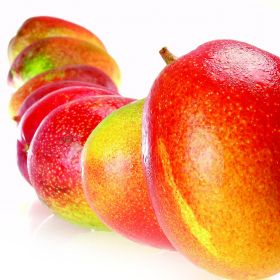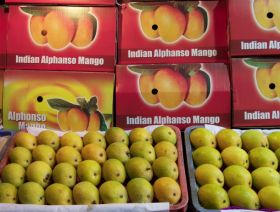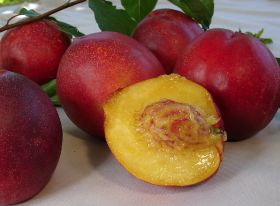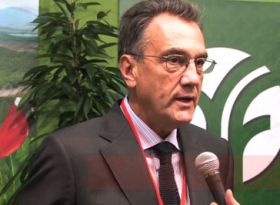Industry News
More trees reaching full maturity and a benign winter were the main reasons for the rise in output during 2013/14

Peru exported 140,000 tonnes of mangoes during the 2013/14 campaign, a 40% increase on the 105,000 tonnes shipped last season according to the latest figures from exporter association Apem.
The association’s general manager Juan Carlos Rivera said the rise was due to favourable climatic conditions during the winter and more plantations reaching full productivity, among other factors. “Also there were no rains during harvesting, which meant the fruit could go on being harvested almost to the end of the season,” he said.
Meanwhile, Angel Gamarra, president of Promango, said 2013/14 had been one of the best seasons in recent years, with 22,000ha planted between Piura and Casma. Piura accounts for around 75% of Peru’s mango output, followed by Lambayeque with 15% and Ancash with 10%.
The leading destination for Peruvian mangoes is the Netherlands (40%), followed by the US (36%), the UK (10%) and Canada (5%).
UK Prime Minister David Cameron to discuss the EU ban on mango imports with the newly elected Indian prime minister, to be announced May 16

Since May 1st, the EU has blocked all imports of Indian mangoes, eggplant, taro plant and two types of gourd until December 2015. The European Commission announced the ban following authorities in Brussels found Indian shipments of fresh produce contaminated with fruit flies last year.
British MPs including Jon Ashworth and Keith Vaz have criticised the ban for the run-on effects to local retailers, importers and distributors as well as Indian farmers. A petition with over 2000 signatures has also been circulated, opposing the ban.
Speaking during Prime Minister’s Questions, Cameron said, “The European Union has to look on the basis of the science and the evidence and there are concerns about particular cross contamination in term of British crops and British interests.
“But I understand how strongly [Mr Vaz] feels and how strongly the Indian community in this country feels and indeed I look forward to discussing it with the new Indian prime minister.”
The Indian mango season lasts from mid-April to early July. With the ban coming in just as exporters were gearing up for the season, and UK imports of Indian mangoes valued at £6.3m (US$10.68m), prices of mangoes within India have now decreased significantly.
Growers’ group toasts a very successful 2013, but change is afoot with a new chairman set to take the helm
Berry Gardens has recorded its highest-ever pre-tax profit return on the back of a strong turnover.
For the 2013 financial year, group turnover was up 2.6 per cent from 2012 to £212.8 million, with pre-tax profits at £3.6m.

As a result, Berry Gardens will be rebating some £2.8m of commissions to its members, and this figure rises to £3.8m when all other 2013 rebates to members are included.
Speaking at the 42nd AGM of Berry Gardens Growers Limited, which was held in Edinburgh at the Dakota Hotel, chairman Paul Kelsey, said: “2013 was a challenging year with a late start to the season due to an exceptionally cold spring. However Berry Gardens rose to the challenge and, under these difficult circumstances, Berry Gardens Limited has delivered an outstanding set of results.
“Berry Gardens has invested significantly in its packhouse over the last few years with the project complete in November 2013. The size of the site has almost doubled from 60,000 sq ft to 110,000 sq ft. In addition, we have we have also introduced significant upgrades to our internal processes and systems meaning the packhouse is now well positioned to handle the expanding counter season volumes from our partners, Driscoll’s and other growers.”
After more than three years as chairman, Paul Kelsey will be stepping down and replaced by his vice-chairman, Alastair Brooks of Langdon Manor Farm, Kent.
As a soft fruit grower, Brooks has been a member of Berry Gardens for 30 years and a board member since 1994.
He said: “Berry Gardens continue to lead the industry with their knowledge, experience and access to exclusive varieties from our partnership with Driscoll’s. As a grower co-operative we work with our customers to ensure quality, efficiency and customer satisfaction.
“The recent good weather has meant an early start to the UK season which we hope bodes well for the rest of the summer.”
Brooks will be supported by Robin Walker as vice-chairman. Walker is currently a non-executive director of Berry Gardens with extensive experience in the food industry, most notably with Heinz.
Marco Eleuteri of AOP Armonia believes the proposal would give a much needed boost to the Italian sector

Spanish strawberry grower-exporter association Freshuelva has approached the Italian association of producer organisations, AOP Armonia, about the possibility of carrying out a joint promotional campaign for Italian and Spanish strawberries.
Freshuelva president Rafael Dominguez’s proposal was reportedly warmly received by the Italian association. Armonia’s vice president, Pietro Caggiano, said he would put the suggestion to its grower members.
“This is a great opportunity for Italy,” said Armonia’s commercial director Marco Eleuteri. “We hope to succeed in involving the main Italian strawberry producers in this project which would give a boost to the sector.”
Retail group’s decision to slash prices permanently on more than 1000 products seen as sign of discounters’ growing influence in the UK
A major round of price cuts unveiled by British retail chain Morrisons on a wide range of grocery items – including fresh fruit and vegetables – is being viewed as a move designed to head off increasing competition from the fresh food offer presented by German discounters in the UK.

The group said the launch of the I’m Cheaper campaign, heralded by television and print advertising, as well as the distribution of free fruit outside the chain’s London Bridge branch, marked “the start of a new cheaper Morrisons”, with prices cut on around 1,200 of its customers’ favourite products, including apples, pears, citrus, tomatoes and carrots.
A new website, powered by mysupermarket.co.uk, will also allow shoppers to view a product’s pricing history, a move clearly aimed at facing up to the discounters as well as the price-driven approach already adopted by rival chain Asda.
“Not temporary reductions or supermarket smoke and mirrors, these are new every day low prices on the things you buy every week,” the company declared. “So you’ll notice the difference with every shop.”
A pack of five or six vine-ripened tomatoes, for example, has been reduced permanently to £0.99 from £1.69, while loose tomatoes will now be sold at £1.55 per kg instead of £1.99 per kg.
New nectarine orchards boosted the South African stonefruit crop this season in what was otherwise a fairly challenging year
South Africa exported 6% less stonefruit this year compared with last season, with adverse climatic conditions changing, ultimately having a major influence on the crop volume.

However, growth in nectarine orchards, which came into production this year, was a saving grace and turned what would have been a bad crop into an average one.
The category which endured the biggest loss was apricots, dropping 13% compared with last year. Nectarines also fell by 5% and plums by 7%. The only growth was in peaches, which experienced a 14% rise, albeit from a smaller volume.
In all, South Africa exported some 15.9m cartons of stonefruit, compared with last year’s record crop of 16.9m cartons. The strength of the industry is however shown by the fact that this season’s crop was still higher than the average of the past three years.
“Plum and nectarine orchards in the Ceres and Klein Karoo regions were mainly affected by hail,” said Jacques du Preez, product manager for stonefruit at Hortgro.
He noted that prolonged spring conditions and rain during the harvest season influenced the quality and volume of the crop: “Despite this we still had an average crop, but it was difficult to manage fruit quality.”
More than 150ha of nectarine orchards came into full bearing during the 2013/14 campaign, Du Preez explained. “This contributed to the average crop realised despite the adverse weather. Cultivars which performed well during the season with an increase in export volumes included August Red (+11%), September Bright (+32%), Sunburst, which had an increase in production of 66 per cent, Diamond Ray (+54%) and Superstar (+40%).”
Observers have said the increase in volumes of these exciting new varieties which are so well know for their exceptional taste is a clear indication of how quickly the nectarine sector is transforming itself to a whole new product offer.
Du Preez expects reasonable increases in export volumes next season because 25-30% of stonefruit orchards are not yet in full bearing. “Early indications for the next season are therefore positive.”
He also referred to South Africa’s promotional campaign in the UK and on the continent, outlining that during the past five years it had gained a lot of momentum.
“The focus so far of our international campaign has been very Eurocentric, but we are busy with a strategy to get a much closer relationship between market access (technical, political and lobbying) and market development. These two will work hand in hand to ensure the opening up of and expanding of markets – firstly in the ME, FE and Africa, but also in other regions of Europe we haven’t been active in.”
Fepex calls for greater protection for producers
Spain has ramped up pressure on the EU to defend the interests of its fruit and vegetable producers. In a meeting of the Joint Hispano-Franco-Italian Committee on Fruits and Vegetables held in Rome on Tuesday, Fepex laid out a series of demands, including tighter controls on the EU’s Entry Price System, an easing on restrictions on pesticide use and improvements in the EU’s management crisis policy.

One of the key demands was for the new EU entry price system for fresh fruits and vegetables, due to come into force on 1 October 2014, to be rigorously applied in order to ensure its efficacy. Fepex which was representing the country at the meeting, said the current system was ineffective as it failed to prevent countries such as Morocco from selling large volumes of produce in the EU at prices below the minimum entry price established by the EU-Morocco Association Agreement.
The new system, which has been fiercely contested by the North African country, is designed to bring greater transparency to imports and prevent countries from avoiding paying import duties.
Fepex also complained that EU restrictions on the use of a number of pesticides was curtailing the competitiveness of producers and distorting the market. It called for the creation of a phytosanitary working group made up of the plant health authorities in the three countries to study the situation and come up with possible solutions.
Premier League stars post banana selfies to support Barcelona’s Dani Alves, who had a banana thrown at him mid-match
Footballers from across the globe have rallied around Barcelona defender Dani Alves after he took a stand against racist abuse by eating a banana thrown at him during a Spanish league match – by posting photos of themselves and their loved ones online eating bananas.

Brazilian international Alves’ compatriots Givanildo Vieira ‘Hulk’ De Souza (who plays for Zenit St Petersburg in Russia), Neymar Da Silva (who also plays for Barcelona), Fernandinho Luiz Rosa (a midfielder for Manchester City), and Oscar Dos Santos, David Luiz and Willian Borges Da Silva (all of whom play for Chelsea) were among those sharing photos on Instagram in a show of solidarity, using variations of the hashtag, #weareallmonkeys (#somostodosmacacos).
The Brazil full-back was preparing to take a corner at Villareal’s El Madrigal stadium on Sunday (27 April) when the banana landed on the pitch next to him. Alves, 30, responded by eating it.
Other footballers to have Tweeted or Instagrammed similar photos include Liverpool striker Luis Suarez, Milan attacker Mario Balotelli, and Borussia Dortmund’s Polish international Robert Lewandowski.
Fifa president Sepp Blatter, meanwhile, also took to Twitter to condemn the treatment of Alves: “What @DaniAlvesD2 tolerated last night is an outrage. We must fight all forms of discrimination united. Will be zero tolerance at #WorldCup,” he Tweeted.
Peter Glazebrook breaks world record for growing the biggest cauliflower, adding to his onion and potato titles
The Brit who has already grown the world’s heaviest onion and potato has now added a colossal cauliflower to his record-breaking collection.

Peter Glazebrook’s latest creation – grown in the East Midlands – is 60lb in weight, and 6ft wide.
The cauliflower, which is of the Darwin variety, has beaten the previous record by 6lb, and is 20 times heavier than the ones consumers are used to buying in supermarkets.
Glazebrook, 69, planted the beastly cauliflower last July, and nurtured it in his greenhouse, feeding it calcium nitrate.
He then switched to a high potash feed once the weather got warmer in March.
Gazebrook, who has now frozen the vegetable for keeping, told Mail Online: “The weighing was conducted at my home because there were no vegetable shows at this time of year. My previous effort last year was weakened by the long cold snap that hit most of the UK.
“The exceptionally mild autumn this time has helped me to clinch this record-breaker.”